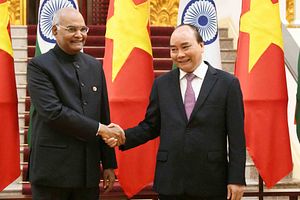It has been an active few months for India-Vietnam relations, with several diplomatic and defense visits being recorded by the two sides. That in and of itself should come as no surprise for those following developments in the Asia-Pacific. Vietnam is one of India’s closest international partners and an important component of India’s Act East Policy. Over the last decade, Vietnam has also become a vital part of India’s strategy to counter China’s rise in Asia.
But while Vietnam-India relations have remained strong, with multiple senior-level visits between the two countries, there are indications that all is not well with the relationship. Put simply, New Delhi might be expecting too much from the Vietnam relationship, while Vietnam, though also very keen on the India relationship, may be facing constraints in how close it can get to New Delhi and how much it can serve New Delhi’s strategic objectives. Indian strategy should consider the limitations that Vietnam faces and pare down its expectations from Hanoi.
On the surface, there are natural affinities that should lead to closer India-Vietnam ties. Historically, the two countries have had good relations going back to the Vietnam War. During that war, India consistently and vocally supported the Vietnamese cause, much to the irritation of Washington and despite India’s dependence on the United States for economic assistance. India even supported Vietnam during its invasion and occupation of Cambodia, despite the fact that this was not a particularly popular position internationally. India also supported Vietnam when China attacked it in 1979, with Foreign Minister Atal Bihari Vajpayee cutting short his visit to China in protest.
These historical ties are now complemented by deep strategic necessity. Both India and Vietnam worry about China’s growing power and domination. Both have had recent experiences of being attacked by China. And both have independently realigned their policies, becoming friendly with the United States as well as traditional American allies in the Indo-Pacific such as Japan and Australia. Both also, of course, have active territorial disputes with China.
These natural affinities have indeed strengthened the relationship between the two countries, especially in the defense and strategic sector. There are frequent high-level visits and meetings between the two sides. The most recent of these was the Indian Chief of Army Staff General Bipin Rawat’s visit to Vietnam on November 22-25. His visit came barely a week after Indian President Ram Nath Kovind completed his state visit, during which he was given the rare honor of addressing the Vietnam National Assembly, which only Chinese President Xi Jinping had done before.
A couple of months before Kovind’s visit, Indian Defense Minister Nirmala Sitharaman also visited Vietnam. Moreover, India has supplied military equipment and military training to Vietnamese armed forces. New Delhi had hoped that this military relationship would further deepen with sales of other equipment such as the Akash surface-to-air missile. India and Vietnam had already concluded a strategic partnership, one of the very few that Vietnam had entered into.
But despite this natural affinity and the closeness of the strategic relationship, there are also indications that there are limits to this relationship. For one, though Vietnam is building up its military strength to defend against China and building partnerships with other like-minded countries, Vietnam faces the same difficulties in balancing against Beijing that most of China’s neighbors face: even as it seeks to increase its capacity to defend against China, Hanoi is also concerned about provoking China.
Thus, Vietnam has been very reluctant to be seen as “ganging up” against China with other countries. In particular, it is wary of being seen to be an integral part of the the Quadrilateral Security Initiative (Quad). Indeed, it is notable that the Vietnamese ambassador to India, Pham Sanh Chau explicitly stated as much in a recent interview in New Delhi.
In addition to multilateral alignments like the Quad, Vietnam also seems concerned about how far it wants to go in deepening the military relationship with India. For instance, though Vietnam has bought some naval equipment from India and has allowed India to train its naval personnel, Hanoi has been reluctant to buy additional equipment from India. India has extended a $500 million line of credit to Vietnam for purchase of Indian military equipment, but much of that remains unused. Indeed, Vietnam had sought to convert some of that for non-defense purchases, which India has refused.
Despite India pushing the Akash surface-to-air missile, Vietnam has appeared resistant to purchase this. There have also been rumors about India selling the BrahMos anti-ship missile to Vietnam, which does not appear to have gone through, though it is not clear whether it is because of Vietnamese reluctance or other factors.
What this suggests is that though Indio-Vietnamese ties are deep, including in the defense sector, and though there may be strong strategic rationale pushing the two countries together, there are also potentially clear limits to the relationship. As much as Hanoi needs greater support, it also has to worry about potential negative Chinese reactions. This is not an idle concern: there have already been concerns raised in the Chinese media about India-Vietnam ties.
New Delhi needs to be careful not to push Vietnam too far, especially considering its own reluctance in being seen as “ganging up” against China. India itself has been dragging its feet on the Quad, it is worth noting. And the concerns about a negative response from China is not limited to India and Vietnam, but is common in most countries in China’s periphery.
China’s tremendous power and its demonstrated willingness to use diplomatic and economic resources to get its way mean that most of its neighbors are reluctant to push balancing strategies too hard. This requires New Delhi to be sensitive to Vietnam’s concerns and not be too ambitious about the potential for the relationship.
































